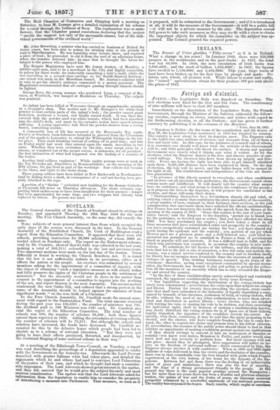SCOTLAND.
The General Assembly of the Church of Scotland closed its sittings on Tuesday, and appointed Thuiday the 20th May 1858 for the next meeting. The Free Church Assembly, on the same day, did exactly the same.
Some subjects of snore general interest than those which occupied the early days of the session were discussed in the later. In the General Assembly of the Established Church, Dr. Cook of Haddington read a report from the Education Committee. It appeared that there were 181 schools, providing instruction for 20,000 scholars, of whom 3000 attended wheel on Sundays only. The report on the Endowment scheme, read by Dr. Crombie, showed that 61,046/ was collected in the last year, making a total of 300,211/. subscribed in the last and previous years. Two important motions were made on the last day of the session. Great difficulty is found in working the Church Benefices Act. It is stated that the law is not sufficiently definite in its provisions, either as it affects the patron or the people. An overture was submitted by several members asking for the appointment of a committee of inquiry, with the object of obtaining "such a legislative measure as will clearly define and fully preserve the rights of the Christian people in the settlement of ministers." But the Assembly would not do more in the matter than consent to the appointment of a committee to inquire into the working of the act, and report thereon to the next Assembly. The second motion condemned the new Oaths Bill, and ordered that a strong protest in the name of the Assembly should be lodged against the omission of those significant words "on the true faith of a Christian." In the Free Church Assembly, Dr. Candlish made the annual statement with regard to the Sustentation Fund. The total amount received during the past year was 108,6381.; the number of ministers was 791. the dividend paid to 700 Ministers was 1381. each. Dr. Candlish also read the report of the Education Committee. The total number of schools was 609, the number of scholars 58,560; both these figures exceed those reported in 1856. Adding the attendants at evening schools, the number of scholars will be 76,811. But although the schools and scholars have increased, the funds have decreased. Dr. Candlish accounted for this by the delusive hopes which people had been led to cherish as to a scheme of national education. "But they were not going to have their efforts paralyzed, thwarted, and disconcerted, by the continual flinging of some national scheme in their way."
At a meeting of the Edinburgh Town-Council, on Tuesday, a report was read describing the proceedings of a deputation appointed to confer with the Government on the Annuity-tax. Afterwards the Lord Provost described with greater fullness what had taken place, and detailed the arguments which he and others had used to convince Lord Palmerston of the justice of their case, and which he thought had made a considerable impression. The Lord Advocate showed great interest in the matter, and they felt assured that he would give the subject his early and most Mzious consideration. The upshot was that the Lord Advocate asked for Information from the deputation to enable him to consider the propriety of uttroducing a measure into Parliament. That measure, so soon as it is prepared, will be submitted to the Government ; and if it is introduced at all, it will be the measure of the Government—it will be a public bill —it will not be a private measure by the city. The deputation craved full power to take such measures as they may see fit with a view to obtain the important objects for which the committee on the subject was appointed. The Council granted the required powers.


























 Previous page
Previous page